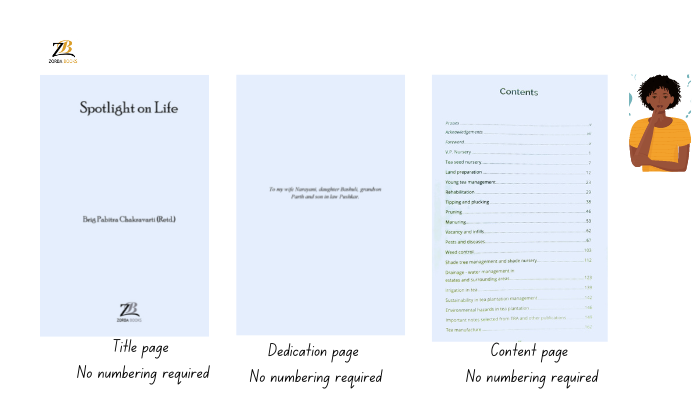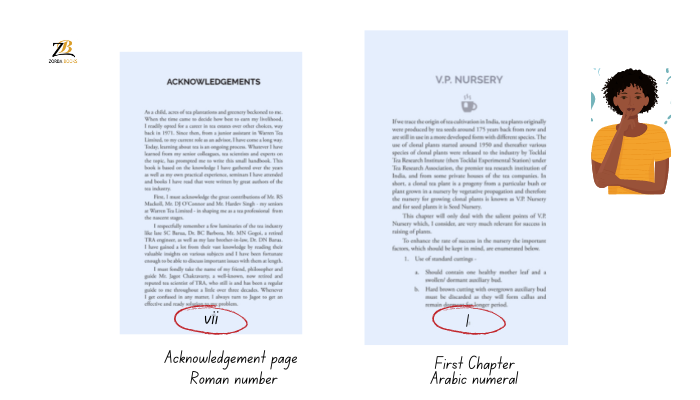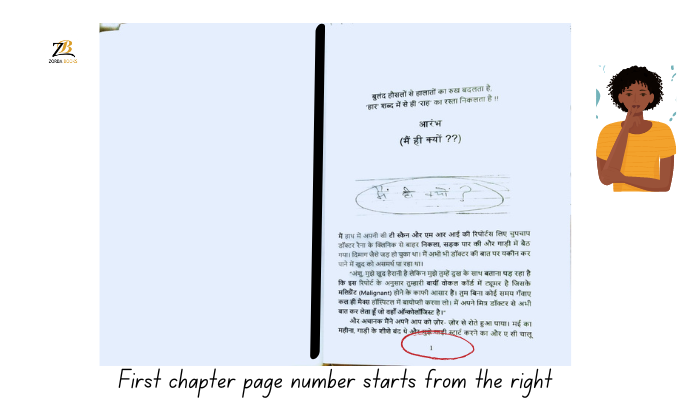
Page Numbering Best Practices
Are you trying to format your book? There is a little designer within all of us that enjoys playing around, aligning our text, and changing a straight font to fancy, regal italics.
If you’re self-publishing, no doubt you wish for things to be perfect: aligned text, bold heading, italicised words. All of it comes together to deliver a seamless reading experience. But, there’s a tiny, minor element of book designing that, despite its size, is crucial enough to destabilise the aesthetic balance of your page and demerit the very purpose of its existence: The Page Numbers- numbering the pages of your book
- Numbering the Pages of Your Book: foreword, index and main text
- Where to start page numbering in a book? Page numbering best practices
- Book Page Number Design: rules and guidelines
- Book Pagination Rules: the un-numbered pages
- Automatic numbering using Writing Tools
- Should page numbers start after table of contents?
- Is it true that page numbers odd on right even on left?
- Is page 1 Always on the right?
Numbering the Pages of Your Book: foreword, index and main text
The story does not start on page one. There are several sections like foreword, dedication, content, maps and even a secondary title page that appear before ‘Chapter One.’ Examples

In the modern world, nothing is static. Not even books because publishing houses are always re-publishing books, giving them newer, enhanced versions. These re-published books aren’t always re-telling of the story, they may include a more contemporary title, updated write-ups, additional write-ups and sometimes, even features written by other authors. With new versions of the book coming out and recent write-ups added after the book has been published, it just makes more sense to have a different numbering method for the front of the book compared to the main text. This type of page numbering also helps keep track of the story’s length.
Where to start page numbering in a book? Page numbering best practices
Arabic page numbering (1,2,3,4,….) starts from the same page as the story, this industry standard has been adapted following age-old conventions. The first page of your main text, i.e. chapter one or prologue must start with the Arabic number “1.”
If you’ve taken up the task of page numbering in a book, ensure your main text is numbered using Arabic numbers (i.e. 1, 2, 3 and so on). Arabic number page one will start from the right side page and will be the first chapter of the book.
However, when it comes to numbering your foreword, use Roman numerals (i.e. i, ii, iii and so on). The foreword might not be numbered i, but a v or vi in most cases. This is because, even though the half-title page or the copyright page aren’t physically numbered, they’re still counted as a part of the book; hence, the foreword takes the number it represents when it comes to page sequence. Examples
If your question is where to start page numbering in a book for the content page, it may or may not be physically numbered. But, in any case, it only takes the Roman numerical.

Book Page Number Design: rules and guidelines
Book page number design isn’t just about the aesthetic. A good book page number designer also considers the practicality of their formatting. There are also some page numbering best practices that have been followed for ages; sticking to them is one way to help readers from experiencing any kind of dissonance.
Here are a page numbering best practices you should keep in mind while numbering the pages of your book.
- Consider the print bleed. Avoid writing down numbers at the very edge of a paper. Print bleed refers to the cutting or erasing of content written at the very edges of a page when they’re printed. In order to prevent this, ensure you give your pages an adequate margin (1″ is more universally used).
- The first page of the main text file must be on the right side of the book. The same goes for most pages of the Prelim file containing: foreword, acknowledgement and content pages.

- Keep in mind the orientation and position of the pages while numbering them. Especially relevant if this document will eventually be printed. If you number the pages of a manuscript such that all page numbers fall on the right side of each page, it is quite possible that readers might not be able to access all the numbers because left side pages containing numbers on the right-hand side will be lost in the book’s spine.
- For odd-numbered pages (i.e. 1, 3, 5 and so on) have the page numbers on the right corners.
- For even-numbered pages (i.e. 2, 4, 6 and so on), the page number should feature on the left side.
- Or, you can always choose to give your page numbers a central alignment.
These ‘page numbering best practices’ are less like a style guide and more of an instruction to ensure the practicality of your design. When it comes to fonts and illustrations, let your creativity run wild. Page numbering can be creative too. Just take a look at a children’s book!

Book Pagination Rules: the un-numbered pages
With so many pages and different rules, it’s pretty natural to feel a little lost about what page gets numbered and which one doesn’t. Here is a table that simplifies this information and makes book pagination rules more manageable for you.
| Page (Purpose/ Title) | Numbering and Formatting |
| Praise For The Book | No numbering |
| Title Page | No numbering |
| Copyright Page | No numbering |
| Dedication | No numbering |
| Quotation | No numbering |
| Blank Page | No numbering |
| Index | Not Compulsory Roman Numerals (Footer Only) Right side of the page / centre |
| Maps | No numbering |
| Foreword | Numbered Roman numerals Right side of the page / centre |
| First Page (Chapter One / Prologue) | Numbered Arabic numerals Right side of the page / centre |
| Subsequent pages | Numbered Arabic numerals Left side for even numbers, right for odd / centre |
| Acknowledgements | Numbered Arabic numerals Right side of the page / centre |
| Notes | Numbered Arabic numerals Right side of the page / centre |
Automatic numbering using Writing Tools
All writing software has tools to assist you in numbering the pages in your book. However, the options provided by these tools can be quite limited compared to more advanced software like InDesign, which has been built solely to design publications.
Many tools also provide an option for “different first page” and “hide the page number on the title page,” which is helpful. But, at the same time, there are scarcely any options to facilitate multiple numbering systems i.e. in many cases, you will have a hard time using the roman and Arabic numerals for numbering in the same document. You can still number your pages in a writing application, but the process would have to be entirely manual.
These options are adequate if you’re numbering a research paper or a rough manuscript. But, to design a proper book, it is best to shift to professional designing software.
Numbering the pages is just a small part of book designing, but it has its own set of rules and regulations. Being thorough with these guidelines will only assist you in sticking to the ‘industry standard.’ Experimentation is always allowed, but beware, your creativity should enhance the reader’s experience and not hinder it!
Now that you know how to number the pages of your book, it will be useful for you to checkout the Number of pages in a book that is considered ideal
How to make an eye-catching book cover
Need help formatting a book?
Need help to publish your book? Connect with us.
Should page numbers start after table of contents?
As per page numbering best practices, page numbering should start after the table of contents. Remember though we do not write the roman numbers for initial pages/prelim file, they are counted in numbering. The page after the table of contents will not start with i) but Vii) Viii) or IX, depending on how many pages preceded the table of contents.
Is it true that page numbers odd on right even on left?
Yes, this is a golden rule to be followed whether you are using Roman numbers or Arabic numbers for numbering the pages in a book. That is how page numbering works for a book, page numbers odd on the right and even on the left
Is page 1 Always on the right?
Yes, page 1 always on the right, whether it is the first few pages of a book or the main file of the manuscript. In case of the prelim pages page one is not written (in Roman) but in the main file page number one is usually written (in Arabic).
More information on Pages and words in a book, novel etc read on:
1. Can the Number of Pages Make or Break A Book?
2. Number of pages in a book according to book genre
3. Book Title Ideas: Choosing Your Own
4. Can I publish without paying?
Need help publishing a book? Contact us
Discover more from ZorbaBooks
Subscribe to get the latest posts sent to your email.
Pingback: Can the Number of Pages Make or Break A Book? - ZorbaBooks
Pingback: Publishing a Book? Number of Pages Matter - ZorbaBooks
Thank you so much for informatiion. I am 82! And i am trying to self publish my first children’s book! I was mainly a high school teacher! And I am not as computer smart as I should be. But I typed my book and wasn’t able to put page arabic numbers on the page for it kept coming up in a different part of the page for each page! Now I want to put numbers on and I don’t think it would be a good idea to print them myself! How would you solve this problem. I am interested in ZorbaBooks. For I want to publish more books. I opened up my own publishing co., Beverlywood Publishing, but I would like to work with other wonderful companies such as yourself. I am a one person co. and my wonderful husband helps me alot! Wishing you a beautiful Holiday Season. Love, Sharon Goldberg Mercado; Beverlywood Publishing; Oro Valley, Arizona; beverlywoodpublishing@gmail.com; beverlywoodpublishing.com. My website is new and needs to be redone and page 2 needs to be added and so on. Yet for now, it is cute. Keep safe
Sharon thank you for sharing your thoughts. We will be getting back soon. Our email is info@zorbabooks.com